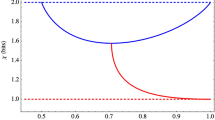Abstract
We present a new framework for creating a quantum version of a classical game, based on Fine’s theorem. This theorem shows that for a given set of marginals, a system of Bell’s inequalities constitutes both necessary and sufficient conditions for the existence of the corresponding joint probability distribution. Using Fine’s theorem, we reexpress both the player payoffs and their strategies in terms of a set of marginals, thus paving the way for the consideration of sets of marginals—corresponding to entangled quantum states—for which no corresponding joint probability distribution may exist. By harnessing quantum states and employing Positive Operator-Valued Measures (POVMs), we then consider particular quantum states that can potentially resolve dilemmas inherent in classical games.
Similar content being viewed by others
References
Meyer, D.A.: Quantum strategies. Phys. Rev. Lett. 82, 1052 (1999)
Eisert, J., Wilkens, M., Lewenstein, M.: Quantum games and quantum strategies. Phys. Rev. Lett. 83, 3077 (1999)
Eisert, J., Wilkens, M.: Quantum games. J. Mod. Opt. 47, 2543 (2000)
Marinatto, L., Weber, T.: A quantum approach to static games of complete information. Phys. Lett. A 272, 5–6 (2000)
Chapter 13 (Quantum Games: a survey for mathematicians) Section 13.10 in V. N. Kolokoltsov and O. A. Malafeyev, Understanding Game Theory: Introduction To The Analysis Of Many Agent Systems With Competition And Cooperation, World Scientific; 2nd edition (2020), and the references within, arXiv:1909.04466
The URL at https://scholar.google.com.au/citations?user=wkfPcaQAAAAJ &hl=en contains an extensive list of publications on the subject of quantum games
Binmore, K.: Game Theory: A Very Short Introduction. Oxford University Press, Oxford (2007)
Osborne, M.J.: An Introduction to Game Theory. Oxford University Press, Oxford (2003)
Rasmusen, E.: Games and Information: An Introduction to Game Theory, 3rd edn. Blackwell, Oxford (2001)
Peres, A.: Quantum Theory: Concepts and Methods. Kluwer, Dordrecht (1995)
Alonso-Sanz, R.: Quantum Game Simulation. Springer (2019) and the references within. ISBN 978-3-030-19633-2
Khan, F.S., Solmeyer, N., Balu, R. et al.: Quantum games: a review of the history, current state, and interpretation. Quantum Inf. Process. 17, 309 (2018), and the references within, https://doi.org/10.1007/s11128-018-2082-8
Frackiewicz, P.: Application of quantum computing to game theory, LAP Lambert Academic Publishing (2014), ISBN-13:978-3659608834
Schneider, D.: Geometrical Exploration of Quantum Games. In: Game Theory Relaunched. Edited by Hardy Hanappi (2013). https://doi.org/10.5772/53931
Bleiler, S.A.: A Formalism for Quantum Games and an Application, arXiv: 0808.1389
Bell, J.: On the Einstein–Podolsky–Rosen paradox. Physics 1, 195–200 (1964)
Bell, J.: Speakable and Unspeakable in Quantum Mechanics. Cambridge University Press, Cambridge (1987)
Aspect, A., Dalibard, J., Roger, G.: Experimental test of Bell’s inequalities using time-varying analyzers. Phys. Rev. Lett. 49, 1804–1807 (1982)
Clauser, J.F., Horne, M.A., Shimony, A., Holt, R.A.: Proposed experiment to test local hidden-variable theories. Phys. Rev. Lett. 23, 880–884 (1969)
Fine, A.: Joint distributions, quantum correlations, and commuting observables. J. Math. Phys. 23, 1306 (1982)
Fine, A.: Hidden variables, joint probability, and the Bell Inequalities. Phys. Rev. Lett. 48, 291 (1982)
Halliwell, J.J.: Two proofs of Fine’s theorem. Phys. Lett. A 378(40), 2945–2950 (2014)
O’Donnell, M.J.: The three-player Prisoner’s Dilemma. http://www.classes.cs.uchicago.edu/archive/1998/fall/CS105/Project/node6.html, Department of Computer Science, University of Chicago (1998)
Iqbal, A., Cheon, T., Abbott, D.: Probabilistic analysis of three-player symmetric quantum games played using the Einstein–Podolsky–Rosen–Bohm setting. Phys. Lett. A 372, 6564–6577 (2008)
Lee, C.F., Johnson, N.F.: Efficiency and formalism of quantum games. Phys. Rev. A 67, 022311 (2003)
Iqbal, A., Chappell, J.M., Abbott, D.: On the equivalence between non-factorizable mixed-strategy classical games and quantum games. R. Soc. Open Sci. 3, 150477 (2016)
Han, Y.-J., Zhang, Y.-S., Guo, G.-C.: W state and Greenberger–Horne–Zeilinger state in quantum three-person prisoner’s dilemma. Phys. Lett. A 295, 61–64 (2002)
Burger, E., Freund, J.E.: Introduction to the Theory of Games. Prentice-Hall, Englewood Cliffs (1963)
Author information
Authors and Affiliations
Corresponding author
Ethics declarations
Conflict of interests
The authors have no competing interests to declare that are relevant to the content of this article. Data sharing not applicable to this article as no datasets were generated or analysed during the current study.
Additional information
Publisher's Note
Springer Nature remains neutral with regard to jurisdictional claims in published maps and institutional affiliations.
Rights and permissions
Springer Nature or its licensor (e.g. a society or other partner) holds exclusive rights to this article under a publishing agreement with the author(s) or other rightsholder(s); author self-archiving of the accepted manuscript version of this article is solely governed by the terms of such publishing agreement and applicable law.
About this article
Cite this article
Iqbal, A., Chappell, J.M., Szabo, C. et al. Resolving game theoretical dilemmas with quantum states. Quantum Inf Process 23, 5 (2024). https://doi.org/10.1007/s11128-023-04218-4
Received:
Accepted:
Published:
DOI: https://doi.org/10.1007/s11128-023-04218-4




